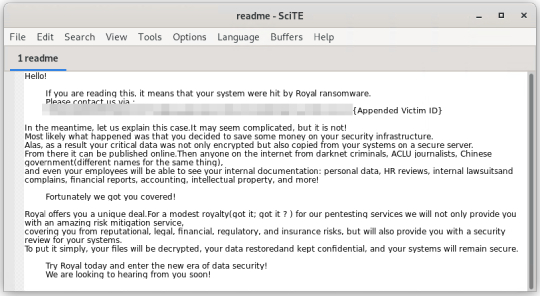Ransom.Linux.ROYAL.THBOBBC
Ransom:Linux/Royal.A!MTB (MICROSOFT), UDS:Trojan-Ransom.Linux.Royal.a (KASPERSKY)
Linux


Threat Type: Ransomware
Destructiveness: No
Encrypted: No
In the wild: Yes
OVERVIEW
This Ransomware arrives on a system as a file dropped by other malware or as a file downloaded unknowingly by users when visiting malicious sites.
It drops files as ransom note.
TECHNICAL DETAILS
Arrival Details
This Ransomware arrives on a system as a file dropped by other malware or as a file downloaded unknowingly by users when visiting malicious sites.
Installation
This Ransomware adds the following processes:
- If the argument -stopvm is used:
- /bin/sh -c esxcli vm process list > list
- /bin/sh -c esxcli vm process kill --type=hard --world-id={World ID of the VM to terminate}
Other Details
This Ransomware accepts the following parameters:
- required to proceed to its encryption routine:
- {path} → directory to encrypt
- -id {32 byte characters} → Victim ID
- -ep {integer from 0 to 100} → used to define encryption parameter
- -stopvm → used to terminate VM processes via ESXCLi command
- -vmonly → used to only encrypt virtual machines
- -fork → used to create a duplicate child process of itself
- -logs → used to display activity logs
Ransomware Routine
This Ransomware avoids encrypting files with the following strings in their file name:
- .royal_u
- .royal_w
- .sf
- .v00
- .b00
- royal_log_
- readme
It appends the following extension to the file name of the encrypted files:
- .royal_u
It drops the following file(s) as ransom note:
- {Encrypted directory}\readme

SOLUTION
Step 1
Scan your computer with your Trend Micro product to delete files detected as Ransom.Linux.ROYAL.THBOBBC. If the detected files have already been cleaned, deleted, or quarantined by your Trend Micro product, no further step is required. You may opt to simply delete the quarantined files. Please check the following Trend Micro Support pages for more information:
Step 2
Restore encrypted files from backup.
Did this description help? Tell us how we did.


